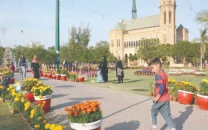Expedite implementation of senior citizens law, Sindh told
SHC gives govt a month to issue Azadi Cards, orders establishment of old age homes

The provincial government earned the court's ire on Wednesday over its failure to implement the Sindh Senior Citizens Welfare Act 2014, which was enacted into law in 2016.
A two-member bench, comprising Justice Muhammad Ali Mazhar and Justice Amjad Ali Sahito, directed the Pakistan Peoples Party-led Sindh government to establish old age homes in every district of Karachi, ensure the provision of Azadi Cards to senior citizens - so they may avail the benefits and privileges as provided under the law - within a month. Justice Mazhar observed that laws are made but there is no implementation.
Read: SHC gives CCI four weeks to issue notification of census results
The law
The salient features of the law state that senior citizens complaint centres will be set up, as well as homes for their physical, mental, emotional and socio-economic well-being.
"This council will also liaise with national and international agencies and NGOs to provide financial assistance to senior citizens," states the law, adding that they will be provided free medical and health services as prescribed by medical officers at government dispensaries and 25 per cent concession on all private hospitals, medical centres and clinics.
Issuance of Azadi Cards
The Sindh Chief Secretary Mumtaz Ali Shah appeared before the bench on Wednesday as it took up a plea seeking implementation of the law.
The bench grilled the chief secretary on the reasons behind the delay in issuing Azadi Cards. The court asked why the matter was not being resolved between the National Database and Registration Authority (NADRA) and the government.
Shah informed the court that a meeting was held with NADRA and it was decided that Azadi Cards will be provided by the federal authority. The Sindh Social Welfare Department will resolve the matter after approval and the process to provide the cards for the elderly will begin in three months, he said.
At this, Justice Sahito inquired why could the government not take access through NADRA and manage the rest on its own. The bench directed the provincial government to adopt a simpler mechanism to provide Azadi Cards.
Benefits at a price?
As the hearing progressed, the bench inquired whether the cards would be provided free of charge to senior citizens.
To this, Shah replied that NADRA will be charging Rs250 for the issuance of each card.
"Who will pay this amount? Senior citizens or the government?" asked Justice Mazhar. "Why can't the government give a subsidy to senior citizens for the acquisition of cards?"
Shah secretary stated that the cards would not be provided free of charge.
But when the court asked what would happen if an elderly citizen could not pay Rs250 to obtain the card, Shah said that the government would be advised to issue the cards free of charge.
The bench directed the chief secretary to ensure no one is deprived of medical facilities due to the price of the Azadi Card. The court further directed the provincial government to ensure provision of the cards to senior citizens within a month.
Read more: SHCC closing clinics on unfounded charges: PMA
Old age homes
Moreover, the Sindh government was directed to establish old age homes in every district of the metropolis.
The bench observed that the children, elderly and women all live at the same place in the government's centres.
Where will women go if there are no relatives or anyone willing to keep them, asked the court. The chief secretary informed the court that an old age home is being established in Landhi. The court directed that at least one old age home should be established in each district given a city as big as Karachi. At this the chief secretary stated that the suggestion would be put forth before the Sindh government and it would try to reserve funds to establish old age homes.
Published in The Express Tribune, May 6th, 2021.


















COMMENTS
Comments are moderated and generally will be posted if they are on-topic and not abusive.
For more information, please see our Comments FAQ